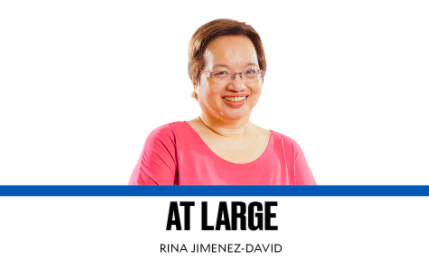
Soon after Typhoon “Ondoy” left our home inundated in over seven feet of muddy floodwaters, we heard that my husband, then a contractual art director with Food Magazine of ABS-CBN publications, was entitled to “cash assistance.”
I asked my friend, the late Bong Osorio who headed the company’s public relations arm, why ABS-CBN included my husband in the list of recipients of what turned out to be a substantial sum. “That’s just the way ABS-CBN is,” Bong replied. “Everyone who works for it is considered family.”
So consider this a family member’s (though once removed) belated public expression of gratitude. And also an added voice to the chorus of support for the renewal of a congressional franchise for the conglomerate.
I mean, c’mon, enough is enough. Enough of stultifying afternoons listening to the harsh, hostile, sometimes imbecilic interrogations. Just last Monday, I couldn’t believe my ears as legislators harked back to years-old grievances over the network’s coverage and even shows, for which network officials duly apologized. The folks at ABS-CBN are no angels, to be sure, but to use the franchise issue as a bully club to smash it to submission is clearly abuse of power.
* * *
Over the weekend, the hubby and I were planning to visit a nearby mall to do some shopping for personal health items. I had prepared a shopping list and mapped out our route. A quick in-and-out trip, or so we thought.
But on the morning of our scheduled excursion, I checked FB and read warning after warning that we were on the brink—if we were not already there—of a “second wave” of COVID-19 infections. Hospitals were full to bursting with emergency cases, said reliable sources, and patients were being turned away. Since we are both seniors and diabetics at that, we decided not to risk it.
This was but the latest of a string of disappointments over the last few months. First, we were told that the sickness, later upgraded to a pandemic, would last for only a few weeks and would “disappear” in a few days. Fearful for our health, we readily conceded to a prolonged quarantine, and watched in increasing horror as police and even military deployed checkpoints, long arms, and armored personnel carriers against an unseen enemy that, we realized, was really we, the people.
A seemingly lackadaisical Department of Health and a disappointing Inter-Agency Task Force for the Management of Emerging Infectious Diseases waited for months before finally getting off their asses and rushing pell-mell into erecting isolation facilities, all the while delaying mass testing and conveying the results to an anxious public. So we have come to this: a “second wave” even as the “first wave” is just cresting, and a public health disaster that seems to have no end in sight.
* * *
Whatever government has or has not done to keep the pandemic in check, at least the private sector has stepped up to do its part.
SEAOIL Philippines, for instance, has its #FuelPHtoRecovery campaign which seeks to soften the blows of the pandemic on its publics. The company is looking after both customers and staff by taking steps to prevent possible infection at every step of the transaction.
As soon as the enhanced community quarantine was put in place, all personnel in SEAOIL outlets were given rubbing alcohol, liquid soap, and gloves for their personal use. The company even provided vitamins to boost the workers’ immunity.
In addition, face masks were distributed to workers in outlets across the country. For this, SEAOIL partnered with Rags2Riches, a social enterprise dedicated to eco-ethical fashion as its way of helping boost the local economy and providing livelihood to the mostly rural and urban poor women who partner with Rags2Riches. The masks were then complemented by face shields designed by Atoy Llave, a car customizer, who perfected the mold to ensure that the item is comfortable to wear even for an extended period of time.
Use of these implements was bolstered by the adoption of contactless payment modes, through the use of PayMaya, GCash, and PriceLOCQ. Customers who preferred to pay in cash or credit card could place their payments in trays, with those using cash encouraged to pay the exact amount to reduce physical contact.
“As we move forward with this new normal, we are making sure that our frontliners are protected and our customers safe when they gas up at SEAOIL,“ said CEO Glenn Yu.
rdavid@inquirer.com.ph